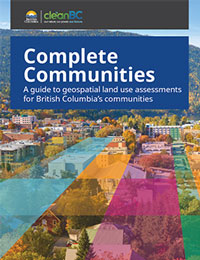Complete communities
Complete communities provide a diversity of housing to meet identified community needs and accommodate people at all stages of life, and provide a wider range of employment opportunities, amenities, and services within a 15- to 20-minute walk. They can be more efficient to service with infrastructure and have the potential to reduce community greenhouse gas (GHG) emissions associated with transportation.
This definition of complete communities is intended to operate as an overall goal, recognizing that complete communities may look different across regions.
Complete Communities Guide
The Complete Communities Guide (optimized PDF, 7.3MB) is intended to highlight how creating more complete communities can support many identified community goals, including those connected to housing, climate action, transportation, fiscal sustainability, servicing, and infrastructure. The Guide demonstrates how different types of data used in conducting geospatial assessments has the potential to support evidence-based decision-making and inspire action that integrates housing development with transportation options and other amenities, with consideration of servicing and infrastructure costs.
The Complete Communities Guide is also available in a high resolution format (PDF, 35.6MB).
Complete Communities Program
The $10M Complete Communities Program, administered by the Union of British Columbia Municipalities (UBCM) on behalf of the Province, supports local governments and modern Treaty Nations in undertaking assessments of their community completeness to identify current strengths, opportunities, and challenges and determine potential actions to increase their completeness.
The Complete Communities Program and Complete Communities Guide (PDF, 7.3MB) support the Communities pathway in the CleanBC Roadmap to 2030 (PDF, 9.4MB).
Under the B.C. Climate Action Charter, a key commitment of all local governments create complete, compact, and energy-efficient communities.
Related links
Contact information
Contact us if you have questions about community energy efficiency and emissions reduction.
250 387-3394
1 800 663-7867
PLUM@gov.bc.ca


